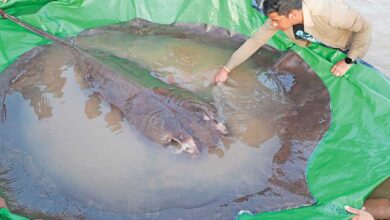Mosquito Defenses

Dengue fever surged worldwide in 2019 despite increased cooperation on prevention and reduction efforts. In Southeast Asia, where the disease is endemic, the numbers of cases more than doubled from the previous year, according to World Health Organization (WHO) data. Major outbreaks also hit Bangladesh, Hong Kong, India, Nepal, Sri Lanka, Timor-Leste and various Pacific island nations, including Palau, Tuvalu and Vanuatu, according to the U.S. Indo-Pacific Command’s (USINDOPACOM’s) Surgeon’s Office.
Soldiers deployed in the Indo-Pacific region need to be vigilant in protecting themselves from such mosquito-borne illnesses in 2020. Whether military personnel are engaged in combat, training or humanitarian relief operations, their health and missions can be compromised by such viruses, according to the USINDOPACOM’s Surgeon’s Office.
“Malaria, dengue, Zika virus, yellow fever, West Nile fever, leishmaniasis, plague, scrub typhus, Lyme disease and a number of other tick- and insect-borne diseases continue to pose a significant health threat” to forces worldwide, according to the U.S. Army Public Health Center (APHC), Entomological Sciences Division. Cases of multidrug-resistant malaria, for example, also soared in Southeast Asia in 2019, bringing a new threat to Indo-Pacific personnel.
The resurgence of dengue in the region is likely due to many factors, including rapid urbanization, more air travel, poor sanitation, increased use and disposal of nonbiodegradable plastics that create new breeding sites for mosquitoes and changes in weather patterns that have also increased mosquito populations, the USINDOPACOM’s Surgeon’s Office said.
USINDOPACOM encourages its Soldiers to rely on the U.S. Department of Defense’s (DOD’s) Insect Repellent System to safely reduce disease risks and annoyances linked to insects. The DOD system entails factory or field treatment of uniforms with permethrin insect repellent; properly wearing the uniform with sleeves rolled down, pants tucked into boots and undershirts tucked into pants; treating exposed skin with DEET, picaridin or IR3535 insect repellent; and sleeping in a permethrin-treated bed net, according to APHC. The U.S. Centers for Disease Control and Prevention recommends DEET as a safe and well-studied product, despite unsubstantiated claims circulating on the internet of its harmful effects. Please see https://www.cdc.gov/malaria/toolkit/deet.pdf for more information.
A few insect-borne diseases have approved vaccines and preventive medications. Military personnel deployed or stationed in malaria-transmission areas, for example, may be prescribed anti-malarial medication, APHC said. Consult a health care provider about appropriate medications or vaccines. FORUM Staff




